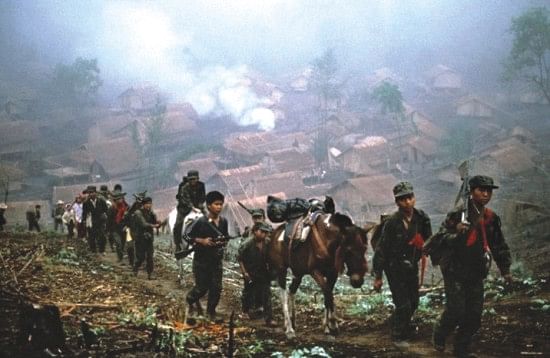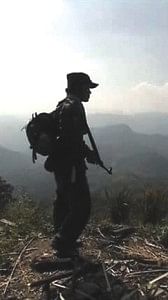|
Neighbours
Trouble in the Golden Triangle
Cracks in the long-standing ceasefire between the Myanmarese army and ethnic rebel groups mean that Thailand must brace itself for a massive influx of refugees
 |
The ceasefire remains fragile in Wa state. |
The Myanmarese sector of the infamous Golden Triangle is once again the centre of the world's attention, and this time around the outcome could be bloody, as well as a big headache for Thailand and China.
Thai and Chinese authorities along the Myanmar border are poised for the possible influx of more than 100,000 refugees if the Myanmarese junta ends its long-standing ceasefire with groups such as the United Wa State Army (UWSA) and turns the clock back to enter into an all-out fight.
The 1989 ceasefire agreements between the ruling junta and these ethnic armies have effectively been shattered following the toppling of the Chinese Kokang group last year. Since then, the ruling State Peace and Development Council (SPDC) has stepped up pressure on the ceasefire groups to surrender their territory and come under the direct command of the government's army. The junta wants to turn them into border guards.
Essentially, this means groups such as the UWSA, the Chin, Kachin, and many others who entered into ceasefire agreements with the government two decades ago following the fall of the Communist Party of Myanmar (CPB), will no longer enjoy the autonomous status that permits them to engage in all sorts of economic activity, including the trade in illegal drugs.
Apologists for the Myanmarese junta could argue that putting an end to these ethnic armies and their autonomous status will put an end to the narcotics business.
But according to a recently released report by the Shan Herald Agency for News (SHAN), groups that have decided to come under the direct chain of command of the SPDC have now replaced groups such as the UWSA as the major drug producers in the region. The newfound status of the former groups has given them the freedom to engage in these illicit activities, the report argued.
SHAN estimated that there are about 400 different militia groups in northern Shan State alone. A number of their leaders are wanted in Thailand as well as by the US federal courts for heroin trafficking.

United-Wa State Army.
Moreover, it is an open secret that profits from the illicit drug trade go to finance infrastructure development, build towns and fatten the bank accounts of Myanmar's top brass.
Millions of methamphetamine tablets coming out of this rugged region flood the cities and streets of Thailand on a weekly basis. One can safely argue that Thailand's bad habit is not Myanmar's top concern. Myanmar's priority has always been security and this time around, military solutions appear to be the path being taken by the SPDC.
The Chinese government has urged the SPDC not to give up on political options, but so far, the junta doesn't appear to be interested in this suggestion. An age-old belief has it that only the Chinese can talk the Myanmarese out of doing anything. But with the routing of the Kokang Chinese outfit, that myth has pretty much been shattered.
To be fair to Myanmar, any normal country wants a secure border. This means no rebel armies operating freely in pockets of territory along its border.
 But then again, it can also be argued that drugs and insurgency in Myanmar are two sides of the same coin. In other words, no drug-enforcement policy can have any chance of success without an adequate solution for all stakeholders. But then again, it can also be argued that drugs and insurgency in Myanmar are two sides of the same coin. In other words, no drug-enforcement policy can have any chance of success without an adequate solution for all stakeholders.
Thailand has a long history of receiving refugees from neighbouring countries. Currently there are scores of refugee camps dotted along the Thailand-Myanmar border, housing hundreds of thousands of refugees from Myanmar. Any move to send them back into Myanmar would likely draw strong condemnation from the international community. And as a responsible member of the international community, Thailand should not consider such a move, at least not until the areas that the refugees are returning to are known to be safe.
But with the latest developments, say military officials along the border, the entire region could very well go up in smoke. They point to the ongoing tension between the SPDC and ethnic armies who are determined to maintain the status quo. Surrendering their commands to the Myanmarese army would mean an end to the very existence of their movements and whatever separatist dream they may have. It could also mean an end to their lucrative businesses, which include the drug trade.
Thailand must think long and hard, especially about the logistical challenges that would come with the influx of hundreds of thousands of refugees. The "good neighbour" policy of the 1970s that permitted hundreds of thousands of refugees from Indochina to enter the country should be reassessed; adjustments that have to be made must be made.
The Nation (Thailand)/ANN
Copyright
(R) thedailystar.net 2010 |
